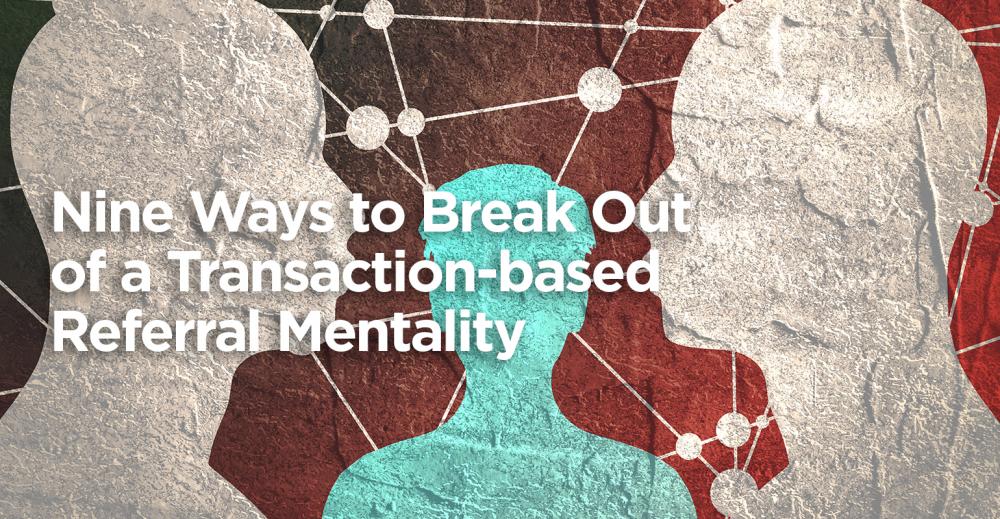1 10
1 10
Become the key, go-to resource for anything in your field. Whether or not it involves a direct referral, you can help your COIs with advice that showcases your expertise. I’ve offered my expertise to any COI I work with to discuss any problem with me that they might encounter in estate planning and administration. I frequently field calls on client matters that I’m not involved with. I make it a point during a casual business lunch with a COI to let her know to feel free to call me about any such situation, as I’m happy to bat around ideas.
I created and use trademarked estate-planning and administrative processes that include my COIs as well as my clients’ trusted advisors as a part of the process itself. Chances are you welcome your clients’ other advisors to participate in your legal, tax or financial meetings. You may assume that your COIs know that you do this, but your COIs might not be fully aware. Take the time to discuss how your legal, tax or financial colleagues fit into your systems and processes.
Many advisors are using podcasts and webinars to provide a unique educational experience for their clients and prospects. Why not interview your COIs or co-brand a webinar that might be distributed to your clients and prospects through your online and social media channels? Consider the value you impart when you open a new content distribution channel to a COI. Beware, of course, of your profession’s compliance and ethical requirements when so doing.
Publishers of professional trade journals like Trusts & Estates and websites like wealthmanagement.com constantly look for content to provide to subscribers. This offers an opportunity for you to jointly author an article or white paper that would provide instant credibility not only to you but also to your co-author. Similarly, but more time consuming and labor-intensive, is to co-author a book addressing your A+ client concerns or an estate-planning topic that you would distribute to other COIs.
COIs don’t often realize their colleagues in related professions would appreciate learning more about how you could work together. As estate tax exemptions increase, for example, estate-planning attorneys spend more time creating income tax efficient estate plans. Beneficiary deemed owner trusts, beneficiary deemed income trusts and optimal basis increase trusts are some of the latest estate-planning ideas that add value for our clients. We’ve created in-house workshops that we present (often over a catered lunch) to our COIs in the financial services and CPA firms, describing how these strategies can be used to benefit clients. We emphasize and tailor the in-house workshop to describe the role of financial advisors/CPAs and how their firms benefit when implementing these strategies. It’s relatively easy to apply for and obtain continuing education credit for the firms you present to.
As a companion to the firm in-house workshop, have you considered conducting a continuing education workshop for related professions, either alone or jointly with another professional? While this strategy might cause some attendees to ruminate on the inner circle problem mentioned above, I’ve found it doesn’t inhibit our success, especially if, for example, as attorneys, we conduct a joint professional workshop alongside a CPA colleague for a group of financial advisors.
Nevertheless, conducting a continuing education workshop for related professionals is a fantastic way to not only showcase your expertise but also open the door to value creation relationships, leading to referrals outside of the quid pro quo mindset.
It’s common for a financial advisor to conduct a workshop with an estate-planning attorney as a guest speaker. These and related ideas offer yet another effective means of solidifying professional relationships. Developing new clients in conjunction with a COI removes both from the “you scratch my back, and I’ll scratch yours” mindset because the client didn’t directly come from one or the other; rather, it was a joint effort.
While your firm may have a unique process related directly to the services you provide, there are always opportunities to create a process that requires the capabilities not only of your firm but also of related professions. Consider, for example, business succession planning. While a law firm may have a process related to the family, legal, and tax decisions and structures that must be made and created, a financial services firm may have financing, employee stock ownership plan creation, retirement planning and insurance capabilities enhancing the client choices. A CPA firm might add audit, valuation, financial reporting and industry compliance expertise. Thinking through a client’s issues while developing a step-by-step multidisciplinary process that can be marketed to prospects, where each firm adds uniquely valuable capabilities, creates a true partnership in generating client leads.
Firms sponsoring and/or participating in charitable and civic events together form yet another bond outside of quid pro quo. A twist on this idea is to include your firm’s client base along with that of another firm in a jointly sponsored charitable event. Hosting a tent at a cancer walk or turkey trot or organizing a soup kitchen day with both client bases offers a feel-good way to mingle with not only your own clients but also those of the co-sponsoring firm.

